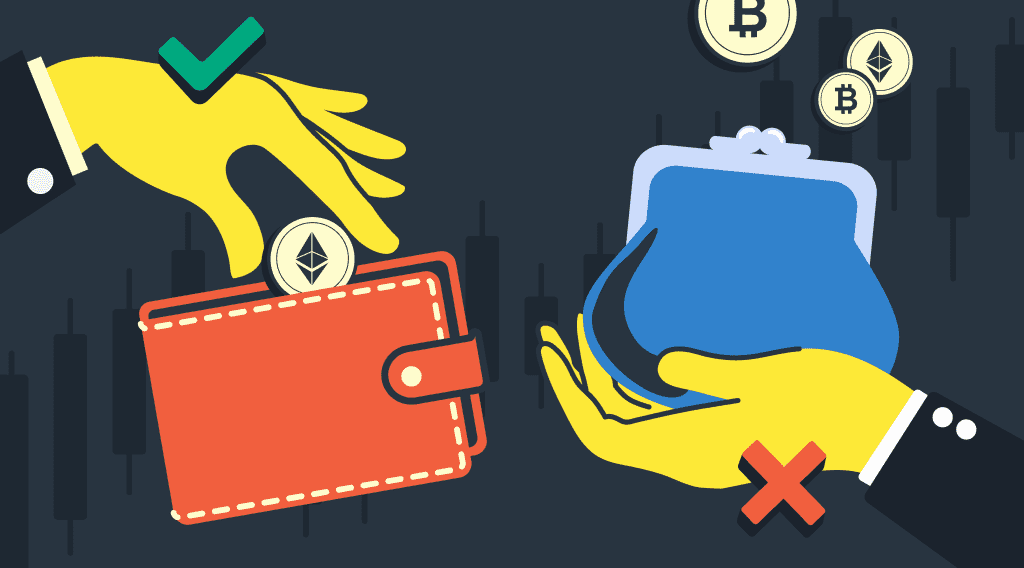How to Choose a Crypto Wallet: What’s Your Style?

Once upon a time, when cash was king, your choice of wallet came down to square or rectangular? Coin purse or not? Bi-fold or tri-fold?
But now we’re holding, spending, tracking, and digital assets, too. You can’t hold these assets in your pocket or stash them under your bed or in a bank. So we need a different kind of wallet: a crypto wallet. And “your style” has a different meaning. The best crypto wallet for you will depend on factors you may not have considered before, including how you use cryptocurrency, how often you trade your digital assets, and your personal definition of security.

Let’s take a look at your options in greater detail. Then you’ll know how to choose a crypto wallet (or wallets) — that best supports your crypto lifestyle.
Article contents
Are All Crypto Wallets Created Equally?
Broadly speaking, there are two types of crypto wallets — hard and soft — and each offers its own benefits and drawbacks. Both types of wallets perform the same basic functions. They’re security devices. They hold your private keys (which resemble complicated passwords) and allow you to access your cryptocurrency assets. Private keys are meant to be secret and you should never share them with anyone. As a crypto owner, you will also generate a public key, which is meant for exchange. Public keys are what allow you to trade cryptocurrency, buy a mocha latte at Starbucks, or pick up groceries at Whole Foods, for example. Private keys prove to the blockchain that you own your cryptocurrency when you transact crypto business.
But that’s pretty much where the similarity ends.
Hard Wallets, Also Known as Cold Wallets
Hard wallets are physical devices. You can fit one in the palm of your hand. You can buy a respectable one for around a hundred bucks. With a hard wallet, your private keys are stored offline in a little box, which is made from hard materials like metal and plastic — hence the name “hard wallet.”
Some experts believe that hard wallets are more secure than soft wallets. That’s because your private keys live in something that you can largely keep safe from thieves. Most people keep their hardware wallets at home or in a safe deposit box. Even if they’re lost or stolen, they are immune to malware and other types of hacking. With a hardware wallet, you will need to keep a record of your private key elsewhere, such as on a piece of paper. Hint: don’t store your private key record near your hard wallet. Don’t keep it on your cellphone, either.
The Drawbacks of Hard Wallets
To access the crypto you store in a hard wallet, you need to have it with you. That presents an inconvenience, given that we’re a world on the go and may want to buy, trade or spend crypto at any time from any place. Hard wallets are, of course, subject to being lost or stolen. Needless to say, don’t leave yours in your car’s console or glove compartment.
Soft Wallets, Also Known as Hot Wallets
Like hard wallets, soft wallets hold your private key. But they are are not physical devices. They only exist electronically. A soft wallet is essentially software — hence the name.
The data stored in your soft wallet is only available via an internet connection. Internet connections are ubiquitous. That means a soft wallet is available pretty much anywhere, at any time. You can connect to it from your cell phone on the Atlantic City boardwalk at midnight or from Yankee Stadium during the ninth inning. In other words, any time you want to buy, sell, or trade crypto — or even pay for a Subway sandwich — your soft wallet is at the ready.
Many crypto exchanges provide their customers with free soft wallets. These are called custodial wallets. Your private keys are known to you and your crypto exchange. But you can also purchase a soft wallet.
Some soft wallets support hundreds of currencies, while others are dedicated to only one coin. Bitcoin- and Ethereum-only wallets are very common. If you choose to “carry” a soft wallet, it makes sense to base your choice on the specific coins you own. Some experts recommend using multiple soft wallets—essentially spreading your crypto holdings so no single wallet holds a vast amount of crypto. Why does that make sense? That leads us to a discussion of the drawbacks of soft wallets.
The Drawbacks of Soft Wallets
Make no mistake. Nothing on the internet is 100% safe, including your personal information and sensitive financial data. Whenever you put something online — whether it’s your retirement account or your credit card number, it’s an invitation to bad actors to take advantage of you.
So arguably, soft wallets are less secure than hard wallets. Let’s say you use a custodial wallet from Coinbase and the exchange suffers a data breach. Your public keys are now in the hands of thieves and you’re extremely vulnerable to crypto losses. Or you’re careless enough to transact crypto business on a public Wi-fi network. Once again, your private keys are exposed and your assets are at risk. But soft wallets are a lot more convenient to use than hard wallets. What’s a crypto owner to do?
The Double Wallet Strategy
Think of it this way. Most of us store money in both a checking account and a savings account. We pay our bills from our checking account and keep the lion’s share of our assets in a savings account. In other words, we fund our day-to-day spending by moving money from our savings account to our checking account. Our checking accounts are attached to our debit cards so we can pay for a round of drinks or do
your grocery shopping conveniently. But carrying a debit card comes with risk. Debit cards and be lost, stolen, or skimmed at an ATM. So we don’t keep a lot in our checking accounts. It’s akin to carrying a lot of cash around — never a good idea.
So many cryptocurrency owners keep a small amount of their crypto in a soft wallet but leave the bulk of their crypto holding in a hard wallet, which is less vulnerable to hacking. When the balance in their soft wallet gets low, they transfer funds from their hard wallets to bring the balance up again. Many experts consider this the safest strategy for holding cryptocurrency. It strikes the right balance between security and convenience.

By Susan Doktor
Author Bio:
Susan Doktor is a journalist and business strategist with over thirty years of B2C and B2B marketing experience. She writes on a wide variety of personal finance topics, including cryptocurrency, real estate, and credit markets. Her contribution comes to us courtesy of Money.com.
best crypto crypto wallet hard wallet soft wallet walletsRecent Articles on Cryptocurrency
 Aergo Price Prediction: Can AERGO Coin Reach $100?
Aergo Price Prediction: Can AERGO Coin Reach $100?  Kaspa Price Prediction: Can KAS Coin Reach $1?
Kaspa Price Prediction: Can KAS Coin Reach $1? 